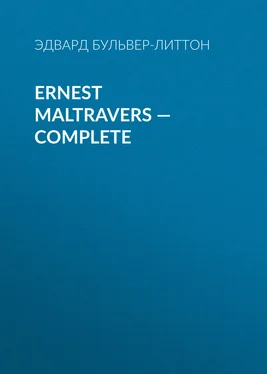“I confess, my dear Ernest, that I long to welcome you back to England. You have been abroad long enough to see other countries; do not stay long enough to prefer them to your own. You are at Naples, too—I tremble for you. I know well that delicious, dreaming, holiday-life of Italy, so sweet to men of learning and imagination—so sweet, too, to youth—so sweet to pleasure! But, Ernest, do you not feel already how it enervates?—how the luxurious far niente unfits us for grave exertion? Men may become too refined and too fastidious for useful purposes; and nowhere can they become so more rapidly than in Italy. My dear Ernest, I know you well; you are not made to sink down into a virtuoso, with a cabinet full of cameos and a head full of pictures; still less are you made to be an indolent cicisbeo to some fair Italian, with one passion and two ideas: and yet I have known men as clever as you, whom that bewitching Italy has sunk into one or other of these insignificant beings. Don’t run away with the notion that you have plenty of time before you. You have no such thing. At your age, and with your fortune (I wish you were not so rich), the holiday of one year becomes the custom of the next. In England, to be a useful or a distinguished man, you must labour. Now, labour itself is sweet, if we take to it early. We are a hard race, but we are a manly one; and our stage is the most exciting in Europe for an able and an honest ambition. Perhaps you will tell me you are not ambitious now; very possibly—but ambitious you will be; and, believe me, there is no unhappier wretch than a man who is ambitious but disappointed,—who has the desire for fame, but has lost the power to achieve it—who longs for the goal, but will not, and cannot, put away his slippers to walk to it. What I most fear for you is one of these two evils—an early marriage or a fatal liaison
Конец ознакомительного фрагмента.
Текст предоставлен ООО «ЛитРес».
Прочитайте эту книгу целиком, купив полную легальную версию на ЛитРес.
Безопасно оплатить книгу можно банковской картой Visa, MasterCard, Maestro, со счета мобильного телефона, с платежного терминала, в салоне МТС или Связной, через PayPal, WebMoney, Яндекс.Деньги, QIWI Кошелек, бонусными картами или другим удобным Вам способом.
For The Disowned is cast in the time of our grandfathers, and The Pilgrims of the Rhine had nothing to do with actual life, and is not, therefore, to be called a novel.
At the date of this preface Night and Morning had not appeared.
In some foreign journal I have been much amused by a credulity of this latter description, and seen the various adventures of Mr. Maltravers gravely appropriated to the embellishment of my own life, including the attachment to the original of poor Alice Darvil; who now, by the way, must be at least seventy years of age, with a grandchild nearly as old as myself.
With a dame he held a gallant conversation.
This ignorance—indeed the whole sketch of Alice—is from the life; nor is such ignorance, accompanied by what almost seems an instinctive or intuitive notion of right or wrong, very uncommon, as our police reports can testify. In the Examiner for, I think, the year 1835, will be found the case of a young girl ill-treated by her father, whose answers to the interrogatories of the magistrate are very similar to those of Alice to the questions of Maltravers.
There certainly was something singular in my sentiments for this charming woman.












